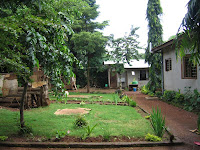Drinks…and more drinks
.jpg) More mud
More mudOn the morning walk to the bus station, we usually pass a number of primary school children on their way to school. There are uniforms here even at the primary level. The boys wear tan pants and the girls blue skirts, and then both have white shirts and a royal blue sweater. They also both wear socks with thick black and white horizontal stripes, like the Wicked Witch of the West. These days nearly all the students seem to be wearing their sweaters despite the fact that it’s about 20C in the early morning with something like 90% humidity. I’m in a short-sleeve shirt and sweat it up on the way to the bus stop, but for these kids, we’re in the cold months.
Today, because of the rains, the bus driver drove farther up the main paved road, so we only had to walk a road crossing the coffee plantations to get to the school. It was a slow, slow walk though, as we had to choose our steps carefully to avoid slipping. In the end, it took us over an hour to get to school and we arrived shortly after the start time of 8am. None of the other teachers were there, however, though Deo told me this is a common occurrence when it is raining during the commute. One would think that if it were raining, the teachers would know that they have to leave home earlier to make it to work on time, but apparently it doesn’t work that way here, or with these teachers. In any case, the first two periods were virtually thrown out the window and the kids left to their own devices – which meant they did nothing. For more details on the school day, check the teaching blog.
I had been hoping to observe some English classes today, but instead got to observe a math class before Deo and I left for town. He wanted to take me to the regional education office to introduce me to the regional education officer. Just getting into town took us about 90 minutes between the muddy walk down the school road and the jammed bus ride.
We had a brief visit with the education officer and other than his somewhat stern word that the government should have been informed of the internship prior to my arrival, he was all smiles and asked me to encourage others to come to Tanzania to volunteer. Deo and I then went to a café to wait for a teacher to bring exams that he had to submit to the education office for verification. The teachers hadn’t gotten them finished before we’d left earlier in the day.
At café’s and restaurants, the seating is usually plastic (a la patio furniture), though the service is generally good. There’s usually a barrel of water with a tap set up somewhere for you to wash your hands and if not, like at lunch yesterday, a server will come over with a jug and hold a basin under your hands as he pours water over them. Not bad for table service, but with nothing to wipe your hands with, it leaves you a little wet.
I had a Coke, but Deo likes his beer. He had a couple as we sat there waiting for the other teacher to bring the papers. This took an incredible amount of time but he eventually arrived. The papers were incomplete and so Deo couldn’t submit them to the office. While we’d been waiting, though, we had run into Mr. Kimolo, the second master at Mawella SS, and so Deo led me to a different café to sit and wait for Mr. Kimolo to hand his papers in so that we could have a drink with him. I thought I had already reached my two soda limit, but it w
.jpg) as hot, so I ordered another one. Deo, of course, had his beer. We had a couple before Mr. Kimolo arrived and then one more with him. Already I’m having trouble doing the math. Deo told me he makes $140 a month and yet he doesn’t think twice about having a couple of beers in town (at $1 a piece) before heading home. Today, it was about 4 and along with the transit fares we paid, that’s already over $5, which if I can divide correctly, is more than what he makes in a day. For someone who is concerned about quality of life, doing distance university courses in the fall, and has a laptop and a motorbike on his wish list for the end of the year, he sure spends his money freely. His wife is a nurse, so they’re doing well with a double income in comparison to others, but I would still have thought he’d be more prudent with his money.
as hot, so I ordered another one. Deo, of course, had his beer. We had a couple before Mr. Kimolo arrived and then one more with him. Already I’m having trouble doing the math. Deo told me he makes $140 a month and yet he doesn’t think twice about having a couple of beers in town (at $1 a piece) before heading home. Today, it was about 4 and along with the transit fares we paid, that’s already over $5, which if I can divide correctly, is more than what he makes in a day. For someone who is concerned about quality of life, doing distance university courses in the fall, and has a laptop and a motorbike on his wish list for the end of the year, he sure spends his money freely. His wife is a nurse, so they’re doing well with a double income in comparison to others, but I would still have thought he’d be more prudent with his money.So we spent a great deal of time at cafes today. Sometimes it’s nice, but when it gets excessive, it sure seems like a waste of time. Then again, here there isn’t much to do when you get home, so perhaps that’s why so much time is spent at cafes.
We had dinner later in the evening and then settled in to watch the Chelsea-Liverpool match. Soccer, of course, is very popular here, and there is a big following for the UK’s Premier League and UEFA’s league of Champions. Tonight was a semi-final for the latter. Tomorrow is May Day, or Worker’s Day, so there is no school. A sleep-in will be nice.
.jpg)
.jpg)
.jpg)
.jpg)
.jpg)
.jpg)
.jpg)
.jpg)
.jpg)
.jpg)
.jpg)
.jpg)
.jpg)
.jpg)








